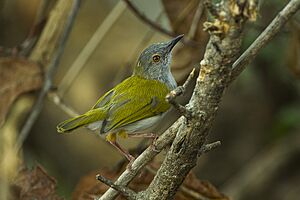Bleating camaroptera facts for kids
Quick facts for kids Green-backed camaroptera |
|
|---|---|
 |
|
| Photographed in Malawi | |
| Conservation status | |
| Scientific classification | |
| Genus: |
Camaroptera
|
| Species: |
brachyura
|
The green-backed camaroptera (Camaroptera brachyura) is a small bird. It is also called the bleating camaroptera. This bird lives in Africa, south of the Sahara Desert. It belongs to the Cisticolidae family. Some scientists think it might be the same species as the grey-backed camaroptera.
Contents
About the Green-backed Camaroptera
This little bird likes to stay hidden. You can usually find it low down in thick bushes. It's a type of passerine, which means it's a perching bird.
Home Sweet Nest
The green-backed camaroptera is very clever at building its nest. It uses large leaves and binds them together. It builds a grass nest inside these leaves. Usually, a mother bird will lay two or three eggs.
What Does It Look Like?
These birds are about 11.5 centimeters (4.5 inches) long. Their upper parts are green, like the leaves they hide in. Their wings are olive-colored. The feathers on their belly are whitish-grey. Both male and female birds look similar. Young birds have a lighter yellow color on their chest.
What Do They Eat?
Like many birds in its group, the green-backed camaroptera loves to eat insects. This means it is an insectivorous bird.
Naming the Green-backed Camaroptera
The green-backed camaroptera was first described in 1821. A French bird expert named Louis Pierre Vieillot gave it its scientific name. He called it Sylvia brachyura. The name brachyura comes from ancient Greek words. Brakhus means "short" and -ouros means "-tailed". So, its name means "short-tailed".
There are different types, or subspecies, of the green-backed camaroptera. These different types live in various parts of Africa.


